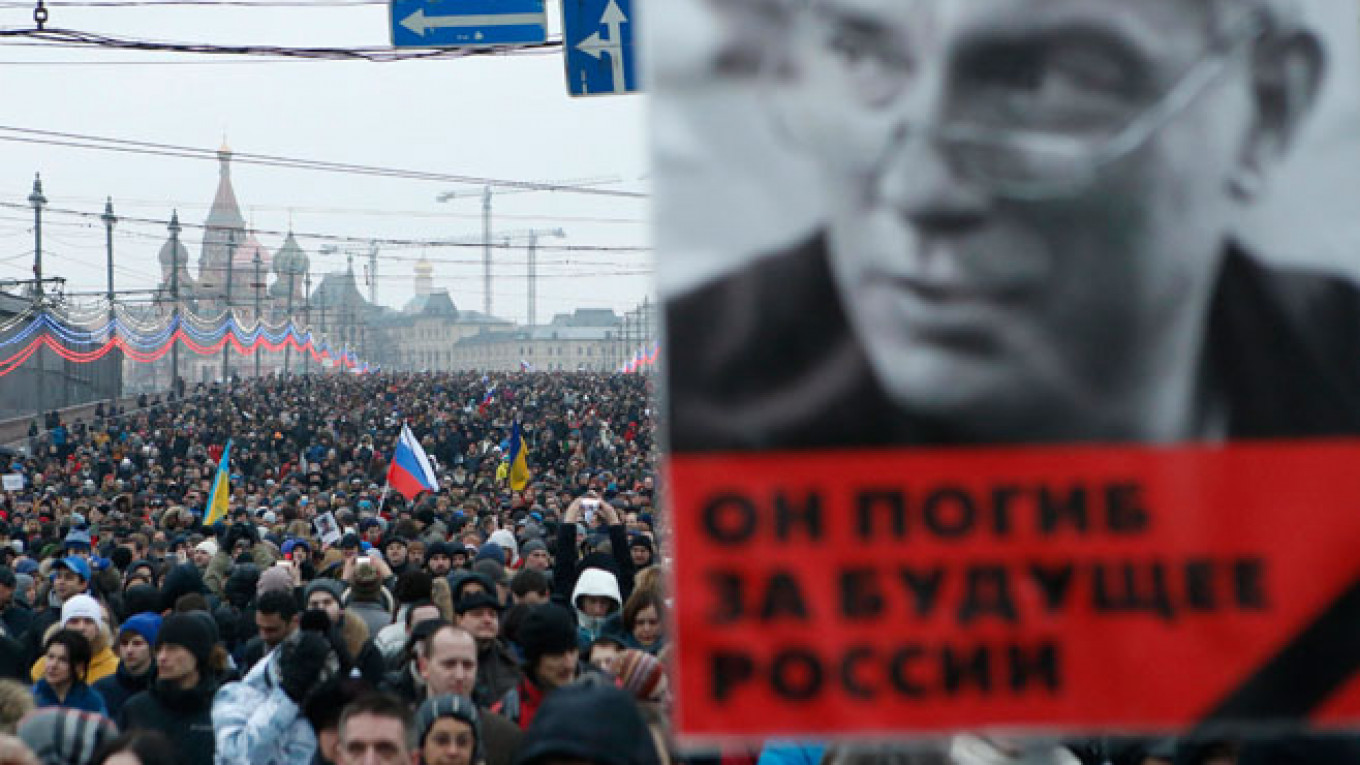With the war in eastern Ukraine escalating anti-Russian sentiment in Europe and the United States, and public opinion in Russia itself becoming stridently anti-Western, the rift between the former Cold War nemeses has been making headlines around the world for months.
Yet even in the Russian political climate precipitated by distrust, fissure and nationalist tensions, the assassination of opposition politician Boris Nemtsov on the night of Feb. 27 has thrown the word "savage" back into the country's political discourse.
Nemtsov was shot in the back, four bullets perforating his head, heart, liver and stomach. The shots were fired from a vehicle on a Moscow bridge outside the Kremlin. He had many enemies, was known to be shadowed by the security services, and received a steady flow of death threats that he seemed to treat with a good degree of humor.
Yet the question of who is responsible for the murder is every bit as relevant at this early stage as what it says about the state of Russian society.
Nemtsov was a vociferous critic of Putin's circle, publishing exposés that revealed unprecedented levels of corruption and mismanagement. According to his friends and colleagues, he was preparing a report on Russia's involvement in the war in Ukraine, something the government continues to deny.
Yet, as perhaps somewhat unceremoniously highlighted by Putin's spokesman Dmitry Peskov, Nemtsov was ''scarcely more than an average citizen'' when seen through the prism of popularity ratings.
His PRP-Parnas party struggled in the polls, and Nemtsov managed to take just over 13 percent of the vote in Sochi's mayoral election in 2009. The line of him being too politically irrelevant to pose a serious threat to Putin's regime has been widely reiterated by those wanting to point the finger of blame away from the Kremlin.
For instance, the motives and suspects under consideration by the Investigative Committee include the following: problems in his personal life, Islamic extremism in response to his position on the Charlie Hebdo attacks in Paris,? Ukrainian radical nationalists, and the "sacrificial victim" ploy which described his death as an attempt to destabilize Russia.
Other unofficial versions suggest foreign secret services involvement and rogue ultranationalists. Some of these are remotely plausible, others seem to do little but make a mockery of the tragedy.
Pro-government commentators have been swift to condemn the eagerness of the Western media to politicize the attack by implicating the Kremlin. A Russian political analyst who appeared as a guest on RT shortly after the murder laughed off claims of Putin's involvement by saying that had he wanted to get rid of Nemtsov, he would have done so more subtly.
How did we get to a point where a statement like this even becomes acceptable within a society?
The sad truth is that what began as a mass media project to foster national pride has taken a very nasty turn. When the president thinks it acceptable to label the opposition as the fifth column and enemies of the state, those closer to the ground feel justified to apply these ideas beyond their semantic remit.
It is enough to look at the rebels of the Donetsk People's Republic who, with the Kremlin's support, felt inspired to continue their battle, even after the cease-fire agreed at Minsk. Take the case of the mother of seven, who now faces treason charges for warning the Ukrainian Embassy of the possible movement of Russian troops toward Donetsk. Shudder at the vehemence of the "Anti-Maidan" rallies, where banners proclaiming ''We are not MaiDOWNS'' are commonplace.
Sunday was supposed to see an anti-crisis rally, but instead become a procession of mourning, spilling out along the river outside the Kremlin. Official figures announced more than 21,000 participants, while realistic numbers indicate more than 50,000. This is an unusually high turnout that indicates that the assassination has had a galvanizing effect on the Russian opposition.
In the words of Mikhail Kasyanov, former finance minister and co-leader of Parnas, ''This is a turning point where everyone needs to assess what is really happening in the country.'' It is unlikely to produce any immediate change to the current political situation, but perhaps the alarm has been set for the wake-up call Russia so desperately needs.
Most of us wanted to hope that the days where government critics were gunned down in the street were over. The government is making a show of doing its best to find the perpetrators, announcing a 3 million ruble reward for any information on the case.
Putin has asked Alexander Bastrykin, the head of the Investigative Committee, to personally oversee the investigation. It is perhaps worth remembering that this is the same Bastrykin who allegedly threatened to arrange the death of a Novaya Gazeta journalist in 2012.
It is also worth keeping in mind that none of those who have met with the same fate as Nemtsov — Dmitry Kholodov (1994), Vlad Listyev (1995), Galina Starovoitova (1998), Anna Politkovskaya (2006), Natalya Estemirova (2009) — among similar promises of justice, have seen it served.
Putin's reaction to Politkovskaya's murder was chillingly similar: a "provocation" that caused more harm to the regime than any of her publications did. If this is not a politicization of murder, it is hard to say what is.
Politkovskaya was killed on Putin's birthday, Nemtsov on his doorstep. These are brazen messages sent to those who sympathize with the opposition.
Regardless of who is behind the most recent assassination, Boris Nemtsov has become the latest sacrificial lamb, slaughtered before a regime for whom violence remains an acceptable part of the political process.
Anna Pivovarchuk is the deputy managing editor and culture editor of Fair Observer.


